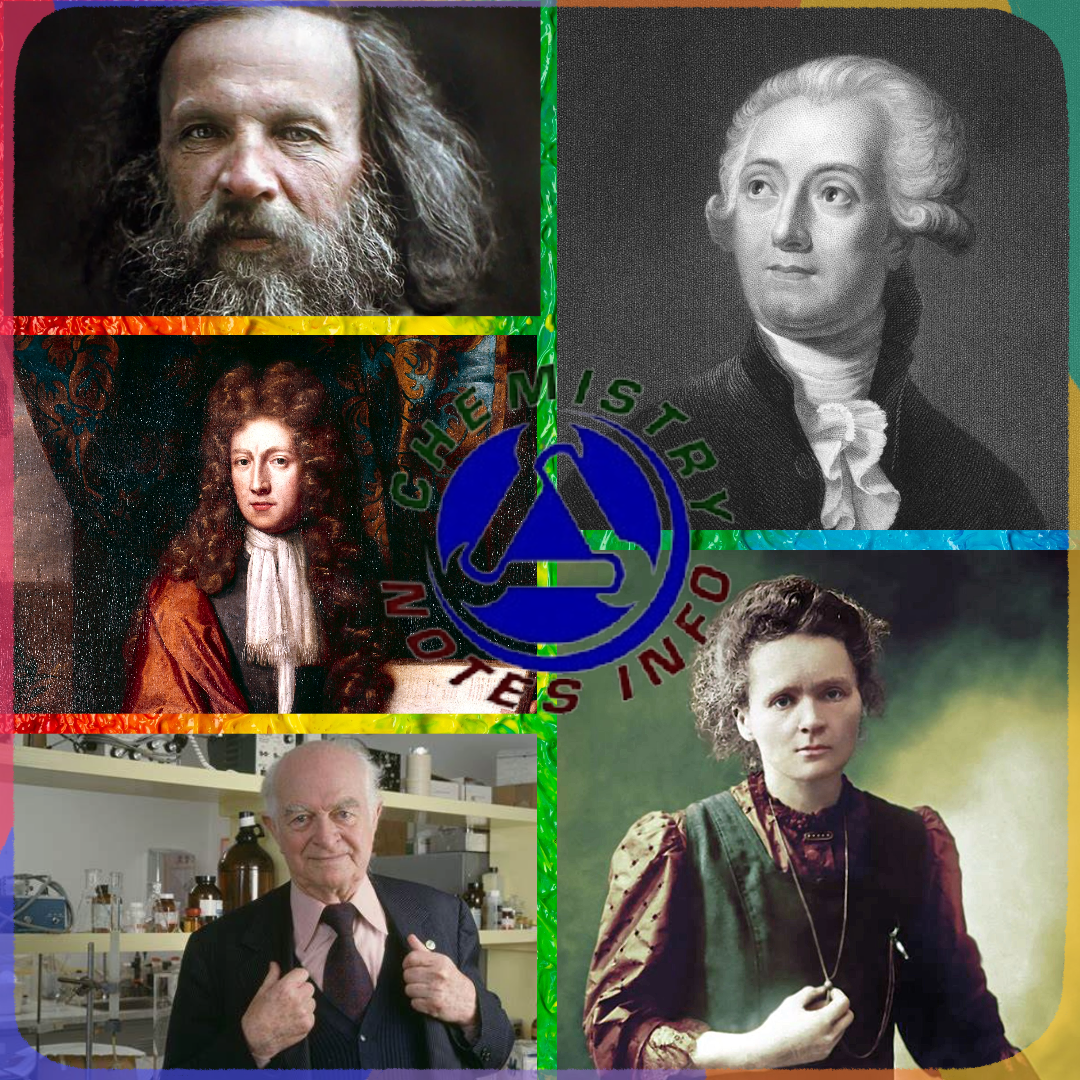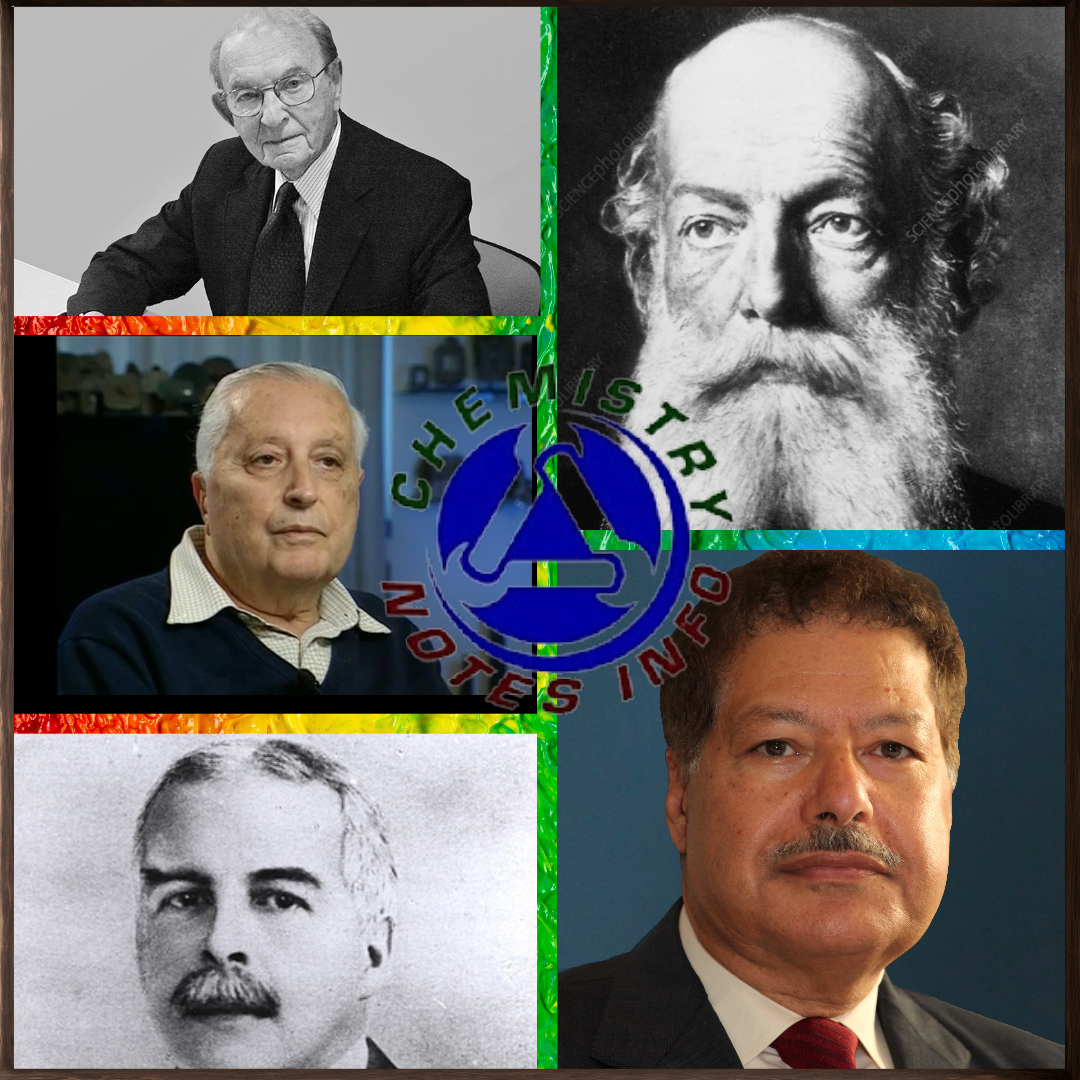Top 10 Famous Chemistry Scientists and their Inventions
Chemistry, as a scientific discipline, has been shaped by the contributions of numerous brilliant minds throughout history. Here are the list of Top 10 famous chemistry scientists and their inventions or discoveries:
Scientist Name | Invention and Discovery |
Antoine Lavoisier | Conservation of mass, modern system of chemical nomenclature |
Dmitri Mendeleev | |
Discovery of polonium and radium, contributions to the understanding of radioactivity | |
Robert Boyle | Boyle's law, foundational work in the development of the gas laws and kinetic theory of gases |
Linus Pauling | Nature of the chemical bond, research on the structure of proteins |
Gilbert N. Lewis | Covalent bond concept, development of Lewis dot structure to represent molecular bonding. |
Friedrich August Kekulé | Formulation of the cyclic structure of benzene |
Ilya Prigogine | Work on dissipative structures and nonequilibrium thermodynamics |
Gilbert Stork | Contributions to organic synthesis, development of synthetic methodologies |
Ahmed Zewail | Femto-chemistry, studying chemical reactions on extremely short timescales using ultrashort laser pulses. |
 |
| Famous Chemistry Scientists and their Inventions |
- Antoine Lavoisier (1743–1794): Antoine Lavoisier is known as the "Father of Modern Chemistry," Lavoisier made groundbreaking contributions to the understanding of combustion, respiration, and the conservation of mass. He also established the modern system of chemical nomenclature.
- Dmitri Mendeleev (1834–1907): Mendeleev is known for the creation of the periodic table of elements. He arranged the known elements based on their atomic masses, leaving some gaps for yet-to-be-discovered elements. His periodic table laid the foundation for the modern understanding of the relationships between different elements.
- Marie Curie (1867–1934): A pioneering physicist and chemist, Curie conducted groundbreaking research on radioactivity. She discovered the elements Polonium and Radium and, along with her husband Pierre Curie and Henri Becquerel, was awarded the Nobel Prize in Physics in 1903 for their contributions to the understanding of radioactivity.
- Robert Boyle (1627–1691): Boyle is best known for Boyle's law, which describes the inverse relationship between the pressure and volume of a gas at constant temperature. This law was fundamental in the development of the gas laws and the kinetic theory of gases.
- Linus Pauling (1901–1994): A highly influential chemist, Pauling made significant contributions to the understanding of the nature of the chemical bond. He also worked on the elucidation of the structure of proteins and was awarded the Nobel Prize in Chemistry in 1954 for his research on the nature of the chemical bond and its application to elucidating the structure of complex substances.
- Gilbert N. Lewis (1875–1946): Lewis is known for his discovery of the covalent bond and his development of the Lewis dot structure to represent molecular bonding. His work laid the foundation for the modern understanding of chemical bonding.
- Friedrich August Kekulé (1829–1896): Kekulé is credited with formulating the structure of benzene, a key concept in organic chemistry. He proposed that benzene has a cyclic structure with alternating single and double bonds, a concept critical to the development of aromatic chemistry.
- Ilya Prigogine (1917–2003): Prigogine was a physical chemist who won the Nobel Prize in Chemistry in 1977 for his work on dissipative structures and nonequilibrium thermodynamics. His contributions were instrumental in understanding the behaviour of complex systems far from equilibrium.
- Gilbert Stork (1921–2021): An American organic chemist, Stork made significant contributions to the field of organic synthesis. His research paved the way for the development of new synthetic methodologies and the total synthesis of complex natural products.
- Ahmed Zewail (1946–2016): Zewail, an Egyptian American scientist, was awarded the Nobel Prize in Chemistry in 1999 for his work on femtochemistry, which involves studying chemical reactions on extremely short timescales using ultrashort laser pulses.
These scientists and their contributions have played a crucial role in the development of the field of chemistry, advancing our understanding of the fundamental principles that govern matter and chemical reactions.
Top10 Famous Chemistry Scientists and their Contributions Infographics
Given below are the articles on many other famous scientists and their notable inventions and discoveries.
- Famous Biotechnology scientists and their inventions
- Famous Chemistry Scientist and their Invention
- Famous Physics Scientist and their Invention
- List of Famous Scientists and their Inventions
- Top 10 famous Indian Scientists and their Inventions
- Famous Forensic Scientists and Forensic Chemist
- 11 Scientists and their Brilliant Inventions
- Famous Female Scientists and their inventions
- 100+ Famous Indian Scientists and their inventions, discoveries, or contributions
- Science Quiz on Famous Scientists and Their Inventions & Discoveries
- Famous Ancient Scientists and their contributions
Explore our Science Book at
Amazon.com Book Store | Amazon.in Book Store | Author Page | Flipkart Book Store | NotionPress Book Store
Explore our Science Book in Hindi Language at
Amazon.com Book Store | Amazon.in Book Store | NotionPress Book Store | Author Page | Flipkart Book Store
Explore our Science Book at
Amazon.com Book Store | Amazon.in Book Store | Author Page | Flipkart Book Store | NotionPress Book Store




%20(1).png)
